Ukrainians go on counteroffensive even as Russia tries to subdue strategic port
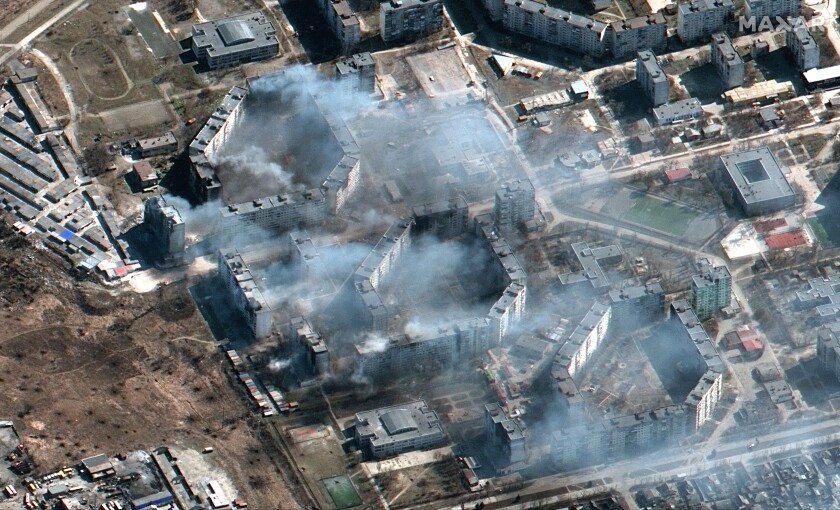
Ukrainian forces defending the capital, Kyiv, managed to wrest back control of a strategic outlying town that Russian troops had earlier captured, Ukrainian officials said Tuesday, but invading troops were reported to have breached the besieged port city of Mariupol, scene of some of the war’s most harrowing attacks on civilians.
Russia’s massive but seemingly foundering invasion of its western neighbor lurched toward the beginning of a second month, as Western officials redoubled warnings that an increasingly frustrated Russian President Vladimir Putin might resort to the use of chemical or other unconventional weapons. That concern was expected to be prominently raised at a North Atlantic Treaty Organization summit Thursday, with President Biden in attendance.
In Russia, where Putin has recently imposed some of the most repressive measures of his more than two decades in power, the country’s premier opposition figure, Alexei Navalny, was sentenced to nine more years in prison on charges of fraud and contempt of court. Navalny responded by calling online for his compatriots to topple Putin, whom he described as a “toad sitting on an oil pipe.”
Ukrainian President Volodymyr Zelensky, meanwhile, sought to frame the Russian attack as a menace that extends well beyond Ukraine’s borders. In a speech to the Italian Parliament — the latest in a series of stirring virtual addresses to Western lawmakers — he described Ukraine as a vital gateway by which “they mean to enter Europe.”
International appeals for a halt to the fighting have so far been fruitless, but U.N. Secretary-General Antonio Guterres made a forceful call Tuesday, branding the war “morally unacceptable, politically indefensible and militarily nonsensical.” Guterres urged serious negotiations, though Russia again rebuffed Zelensky’s call for direct talks with Putin.
In Mariupol, where satellite photos and accounts from residents who have escaped painted a picture of unending destruction, desperate rescue attempts continued Tuesday. Officials have said survivors of missile attacks, including strikes on a theater and an art school that together sheltered more than 1,400 people, have been trapped under rubble for days.
In Washington, a senior U.S. Defense official told reporters Tuesday that Russian forces were inside the devastated city, whose prewar population of nearly 450,000 has dwindled to about a quarter of that number, according to Ukrainian officials. But the city remained in Ukrainian hands despite new bombardment Tuesday, local officials said.
Seizing control of Mariupol, on the Sea of Azov, would give Russia a coveted land bridge to the Crimean peninsula, which it grabbed and illegally annexed eight years ago.
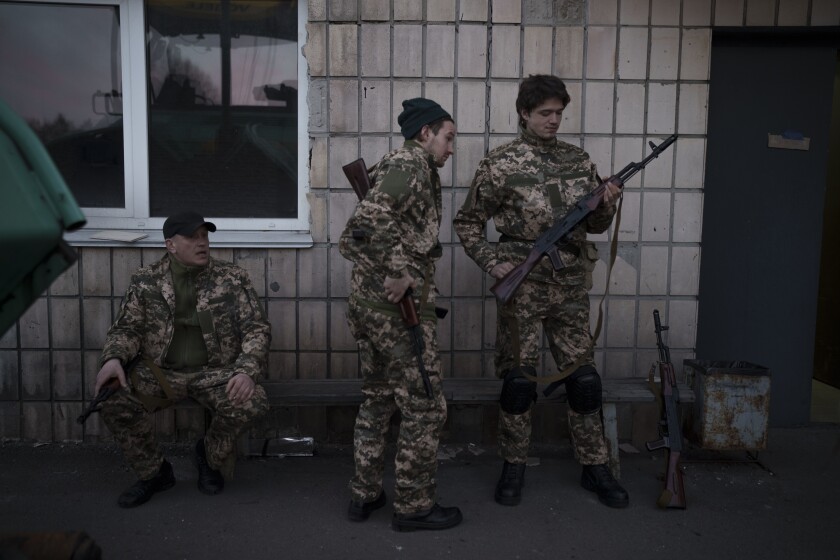
The push-and-pull of combat continued elsewhere, with outgunned Ukrainian forces at times trying counteroffensives and at times being driven back. Ukraine reported Tuesday that its forces had recaptured a western Kyiv suburb, Makariv, giving them control of a major access point to the capital and allowing them to block Russian advances from the northwest.
At the same time, the Ukrainian Defense Ministry said Russian troops had partially taken other northwestern Kyiv suburbs, including Bucha and Hostomel. In an overnight video address, Zelensky said that Russia also launched strikes in Zaporizhzhia in the south, leaving four children hospitalized.
Rescue crews were in Zhytomyr, west of Kyiv, where the Ukrainian emergency service said 13 residential buildings were destroyed or damaged by shelling. The mayor of Boryspil, a city 25 miles east of Kyiv, called on residents to abandon their homes because of the violence.
In the south, local authorities reported blasts in two towns, Zelenodolsk and Mala Kostromka, though it was not known whether there were casualties.
“The enemy is slowly trying to move, to go on the offensive somewhere,” Zelensky said.
The continued assault on Ukrainian cities came as international authorities said Russia was resorting to more destructive weapons. U.S. officials say Russia has launched hypersonic missiles, which travel at up to 15 times the speed of sound.
The Pentagon suggested Tuesday that the use of hypersonic missiles might be due to a lack of available alternatives. Calling the missile a “sledgehammer,” Defense Department spokesman John Kirby said its use “could very well be tied to inventory” and to “performance problems that they’re having with respect to precision-guided munitions.”
Putin has repeatedly made unfounded allegations that Ukraine is developing chemical weapons with U.S. assistance. Linda Thomas-Greenfield, the U.S. ambassador to the U.N., on Tuesday called those claims “ludicrous” and warned they were “a precursor for Russia’s plans to use chemical weapons” itself. Biden voiced similar concerns a day earlier.
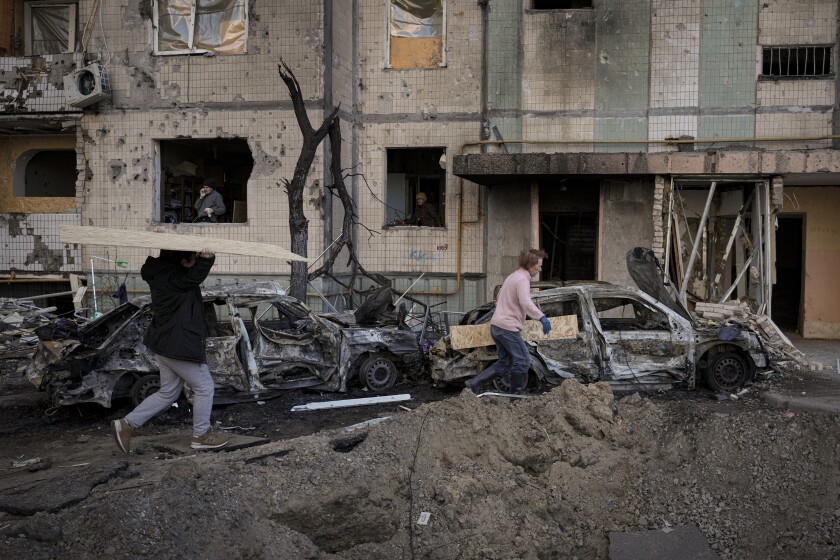
The war has sent more than 3.5 million people fleeing Ukraine and made air-raid sirens, rubble and fires part of everyday life in Kyiv and other cities. In addition to refugees who have left for such countries as Poland and Romania, more than 6.5 million people are internally displaced in Ukraine, according to the U.N. — meaning that nearly 1 of every 4 residents has been displaced inside or outside the country.
The fighting shows little sign of stopping even as international intelligence groups and Western officials said Ukrainians were largely fending off Russian advances and even notching some gains.
The U.S. is “starting to see indications that [Ukraine is] now able and willing to take back territory that the Russians have taken,” said the senior U.S. Defense official, who briefed reporters on condition of anonymity.
Weeks after the invasion was launched Feb. 24, the official said there was no indication Russia was managing to resupply its troops, and some soldiers were even suffering from frostbite because they were not given the right cold-weather gear.
The British Defense Ministry, in an analysis released Tuesday, said Russian forces outside Mariupol and elsewhere “have endured yet another day of limited progress with most forces largely stalled in place.”
In another assessment, the Washington-based Institute for the Study of War said that Russia was sending “low-quality” and “low-readiness” reserve troops in the face of losses.
Accurate figures on military deaths are hard to come by. Numbers released this month by the Ukrainian government said that at least 1,300 of its soldiers have died, while Russia claims the number is higher. Russia has put its own troop losses at about 500, but on Monday, Komsomolskaya Pravda, a pro-Kremlin news site, said that more than 9,800 Russian soldiers had died. It later deleted the information and said it had been hacked.
The United Nations says more than 900 civilians are dead from the war. The actual number is probably much higher; Mariupol officials say that more than 3,000 people in their city alone have been killed.
Despite near-daily Russian strikes on Ukrainian population centers, the loss of territory to Russian forces in the east and south and millions of lives upended by the fighting, government officials have portrayed Ukraine as positioned to eventually prevail.
“27th day of the war. Ukraine is combat-ready and logistically mature. It is bad that the war started in Ukraine, but we have proved that Ukraine is the most mobilized country,” Ukrainian presidential advisor Mykhailo Podolyak tweeted Tuesday.
Some areas of Ukraine have remained relatively safe. In Lviv, a western city that’s become a stopping point for refugees traveling to Poland, sirens sound each day, but populated areas have not been attacked. The closest hit has been on an unoccupied aircraft repair center on the city outskirts last week.
Despite Russian military setbacks — or perhaps because of them — the Kremlin again threw cold water on Zelensky’s request for a meeting with Putin, saying that “from the Ukrainian side,” there had not been sufficient progress to merit such an encounter.
Talks are moving “much more slowly and less substantively than we would like,” Kremlin spokesman Dmitry Peskov said Tuesday, according to Russian state-backed news agency Tass.
Zelensky said last week that he accepts that NATO membership is unlikely. Russia has listed nixing Ukraine’s NATO aspirations as one of several non-negotiable demands.
The Ukrainian leader has also suggested that relinquishing Ukrainian claims to Crimea, which Russia annexed in 2014, and Donbas, a southeastern region that’s home to a pro-Russia separatist movement, were also up for discussion. But he added that any “historic” changes would require a national referendum.
McDonnell reported from Lviv, Kaleem from London and King from Washington. Times staff writer Sarah D. Wire in Washington contributed to this report.
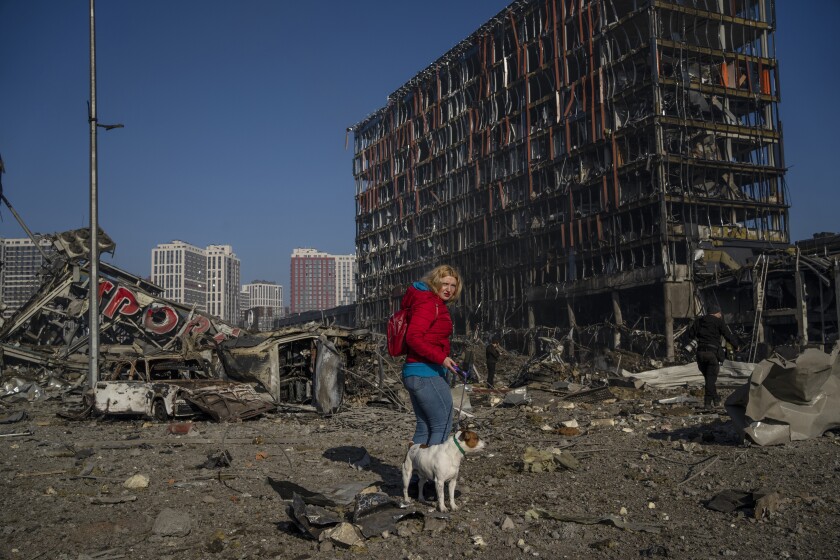
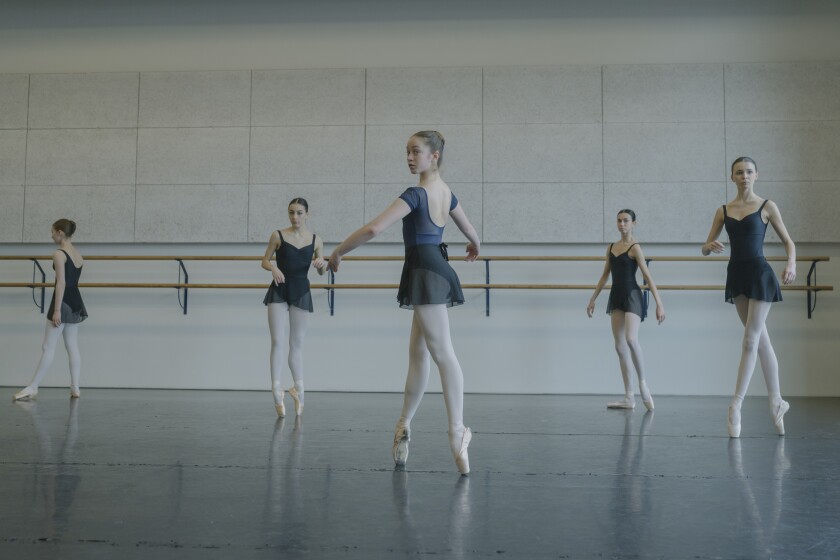
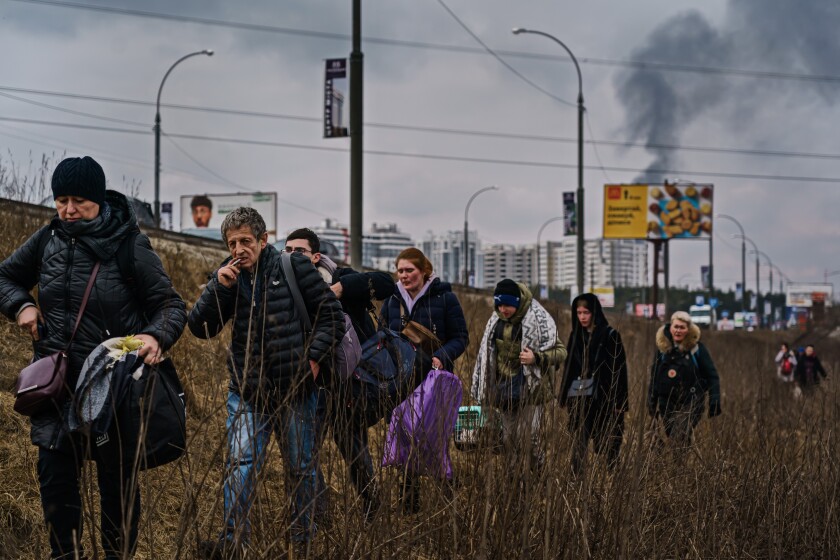
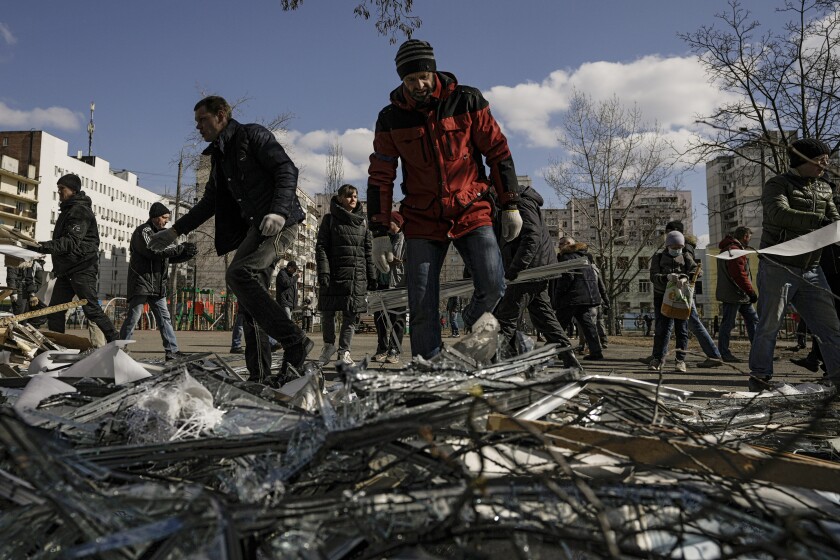
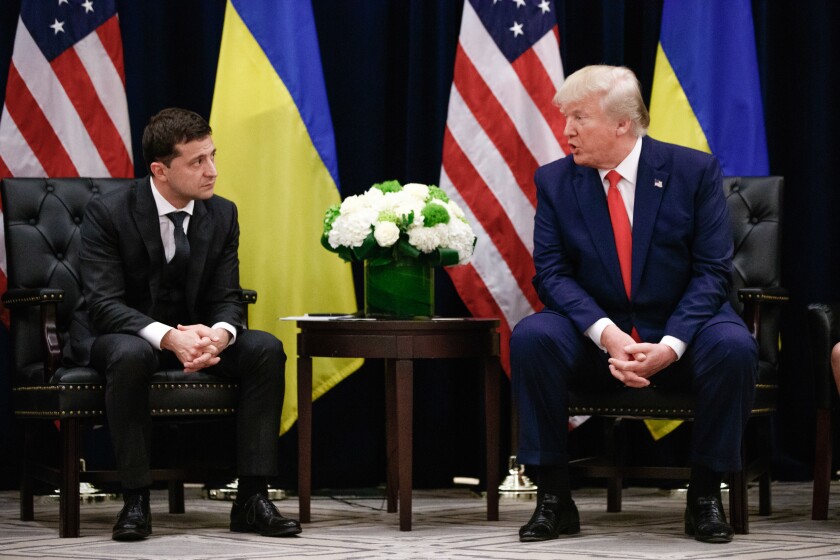
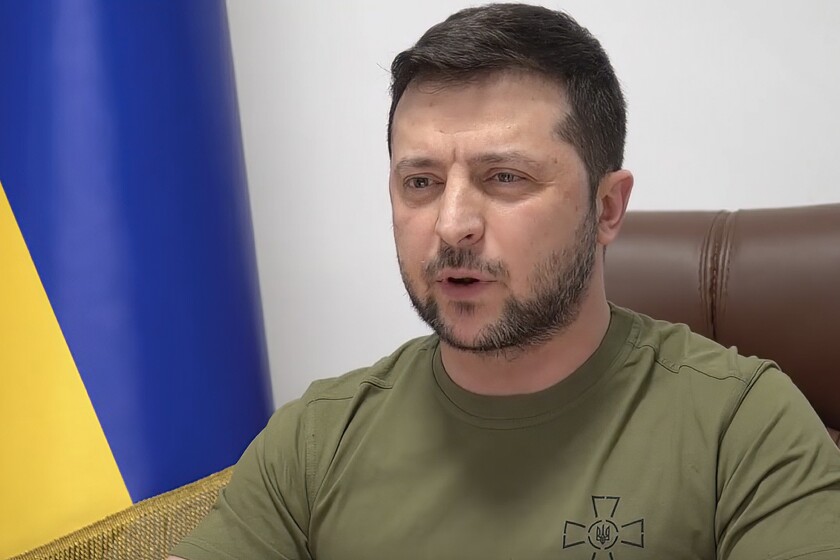



No comments:
Post a Comment